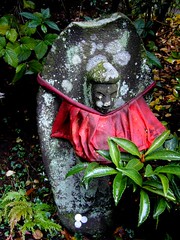 After her Princess Industrial Complex article a few weeks back, a friend reminded me of a much earlier article Peggy Orenstein had written for the NY Times Magazine about having a miscarriage while on assignment in Japan.
After her Princess Industrial Complex article a few weeks back, a friend reminded me of a much earlier article Peggy Orenstein had written for the NY Times Magazine about having a miscarriage while on assignment in Japan.
I vaguely remembered it because it was mentioned jizo [pronounced gee-zoh], the incarnation of Buddha who watches over miscarried and aborted fetuses, stillbirths, and children who died very young. Jizo can be spotted along the roads and intersections all over, especially in rural Japan. When I first lived in Japan, in the town of Inuyama [Dog Mountain, gotta love it], my address was jizo-shita [below the jizo], which, I remember thinking when I read Orenstein's article in my kid-free stupor, suddenly seemed really odd and sad. In the back of my mind, I'd thought a worn, old, little, moss-covered jizo would make a cute souvenir. But then, I also thought a giant ebony-and-gilt-covered butsudan altar would make a great entertainment center, too. Fortunately for my karma, I never followed through on my fleeting impressions. Anyway, here's Orenstein
I had never previously considered that there is no word in English for a miscarried or aborted fetus. In Japanese it is mizuko, which is typically translated as ''water child.'' Historically, Japanese Buddhists believed that existence flowed into a being slowly, like liquid. Children solidified only gradually over time and weren't considered to be fully in our world until they reached the age of 7. Similarly, leaving this world -- returning to the primordial waters -- was seen as a process that began at 60 with the celebration of a symbolic second birth. According to Paula K.R. Arai, author of ''Women Living Zen'' and one of several authorities I later turned to for help in understanding the ritual, the mizuko lies somewhere along the continuum, in that liminal space between life and death but belonging to neither. True to the Buddhist belief in reincarnation, it was expected (and still is today) that Jizo would eventually help the mizuko find another pathway into being. ''You're trying to send the mizuko off, wishing it well in the life that it will have to come,'' Arai says. ''Because there's always a sense that it will live at another time.''Mourning My Miscarriage: In Japan, I find a Culture Willing to Acknowledge My Loss, by Peggy Orenstein [nytmag 4/21/02, now only in google's cache, thanks elaine]
Lego Jizo [flickr]

Thank you so much for posting this. I miscarried in August and this was the best article anyone passed along at the time. I have a jizo statue that brings me a lot of comfort. As many people as possible should see this article.
You can also see Jizo statue in the Rurouni Kenshin Tsuiokuhen OVA.